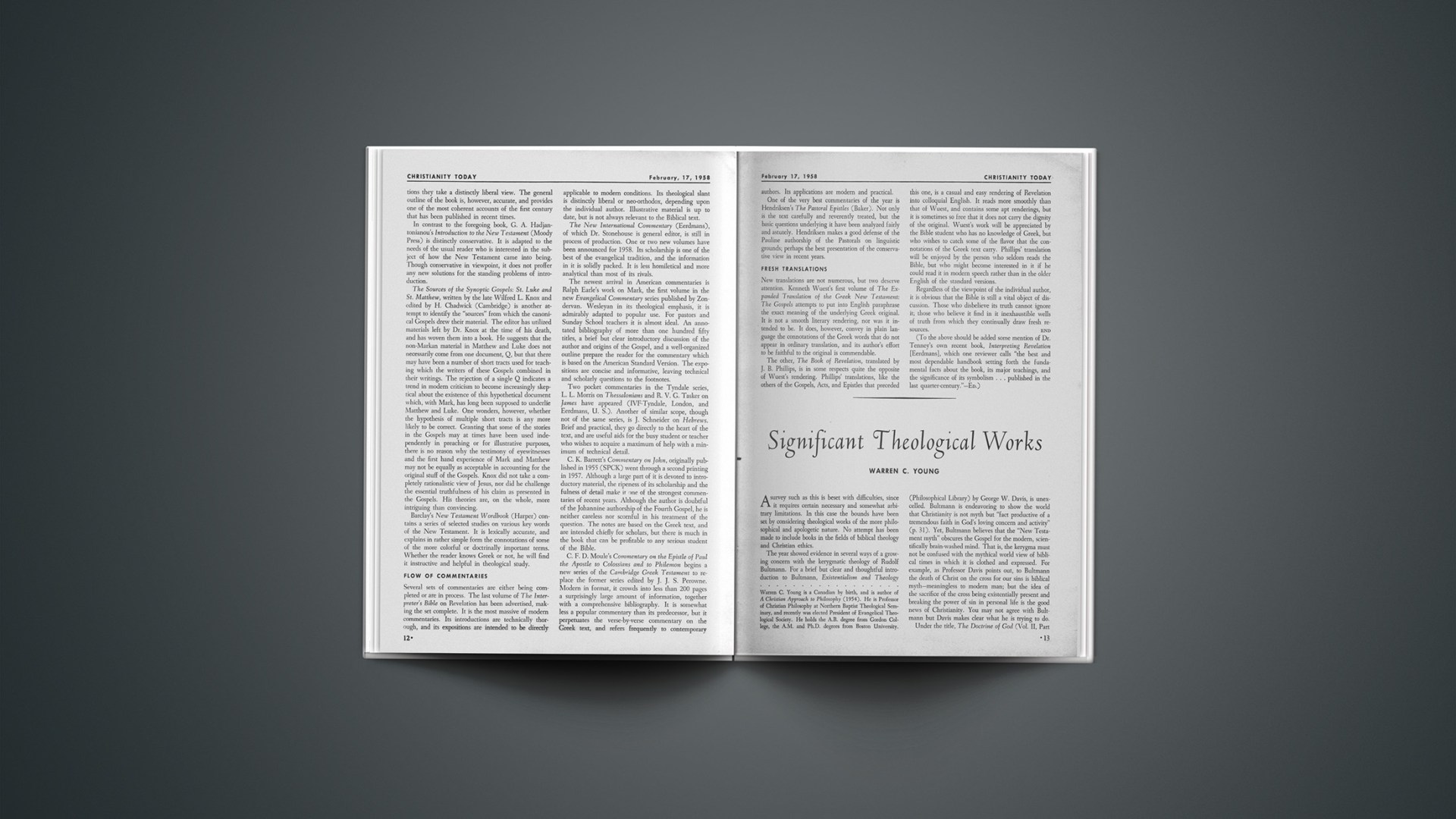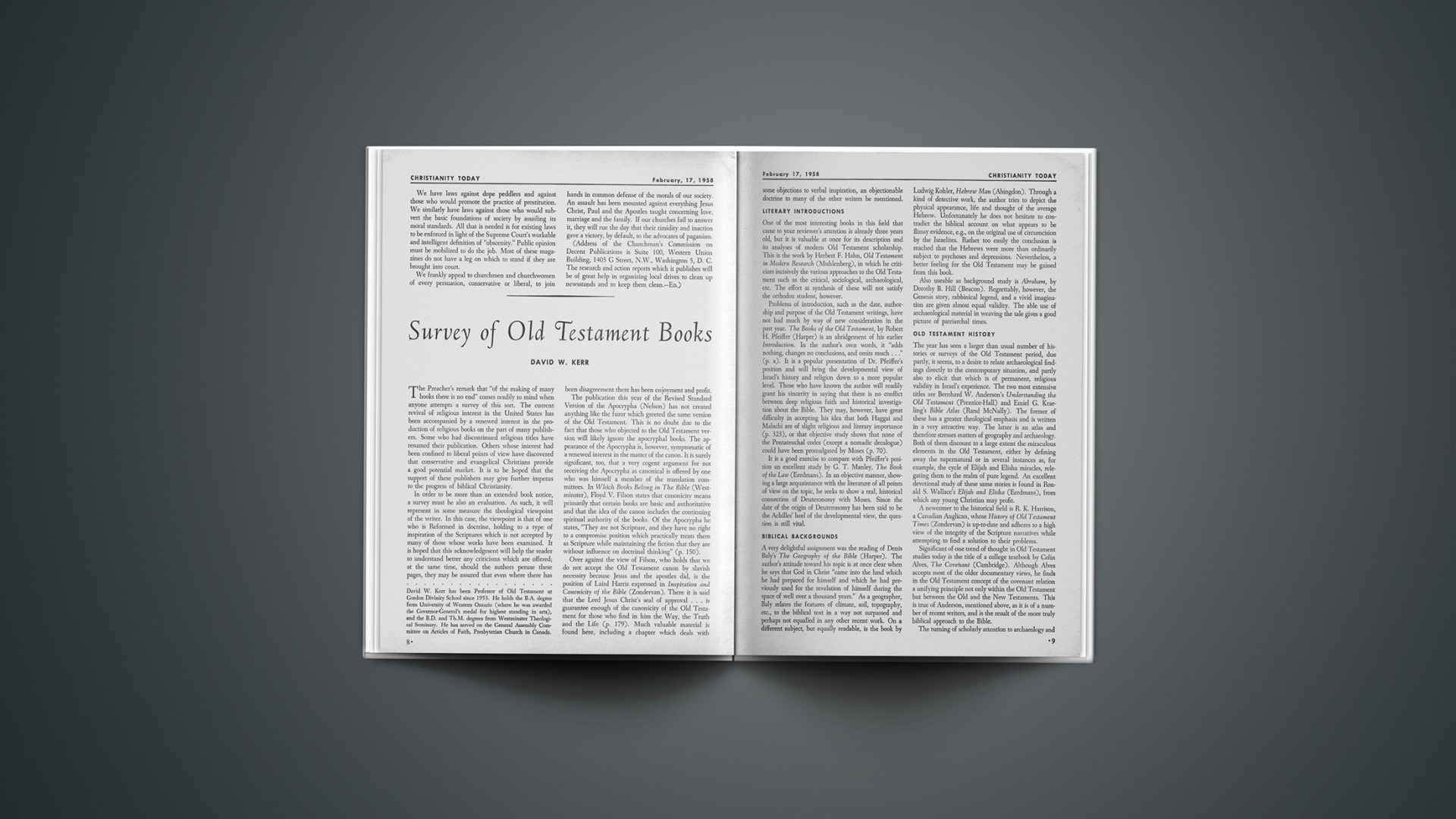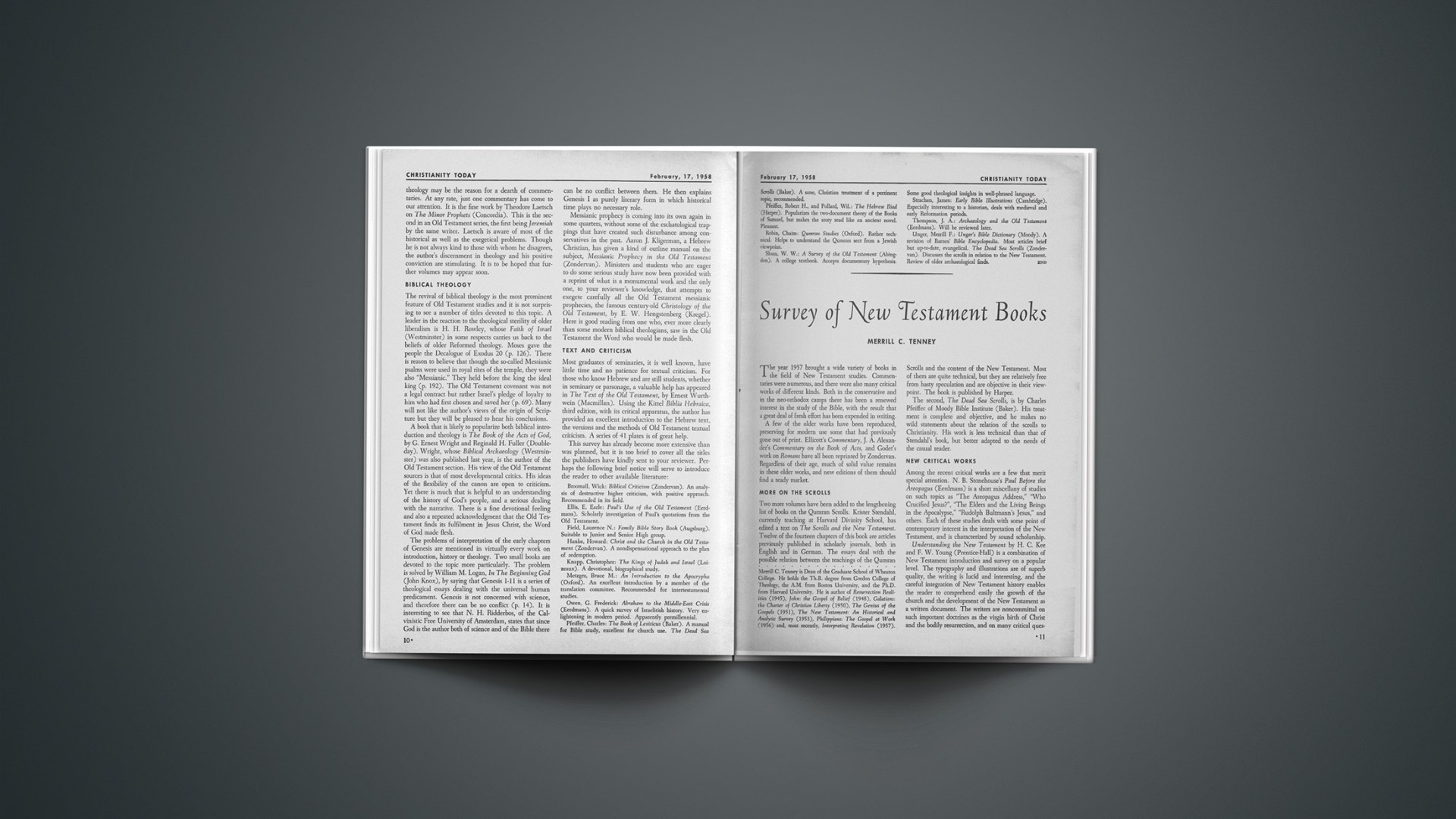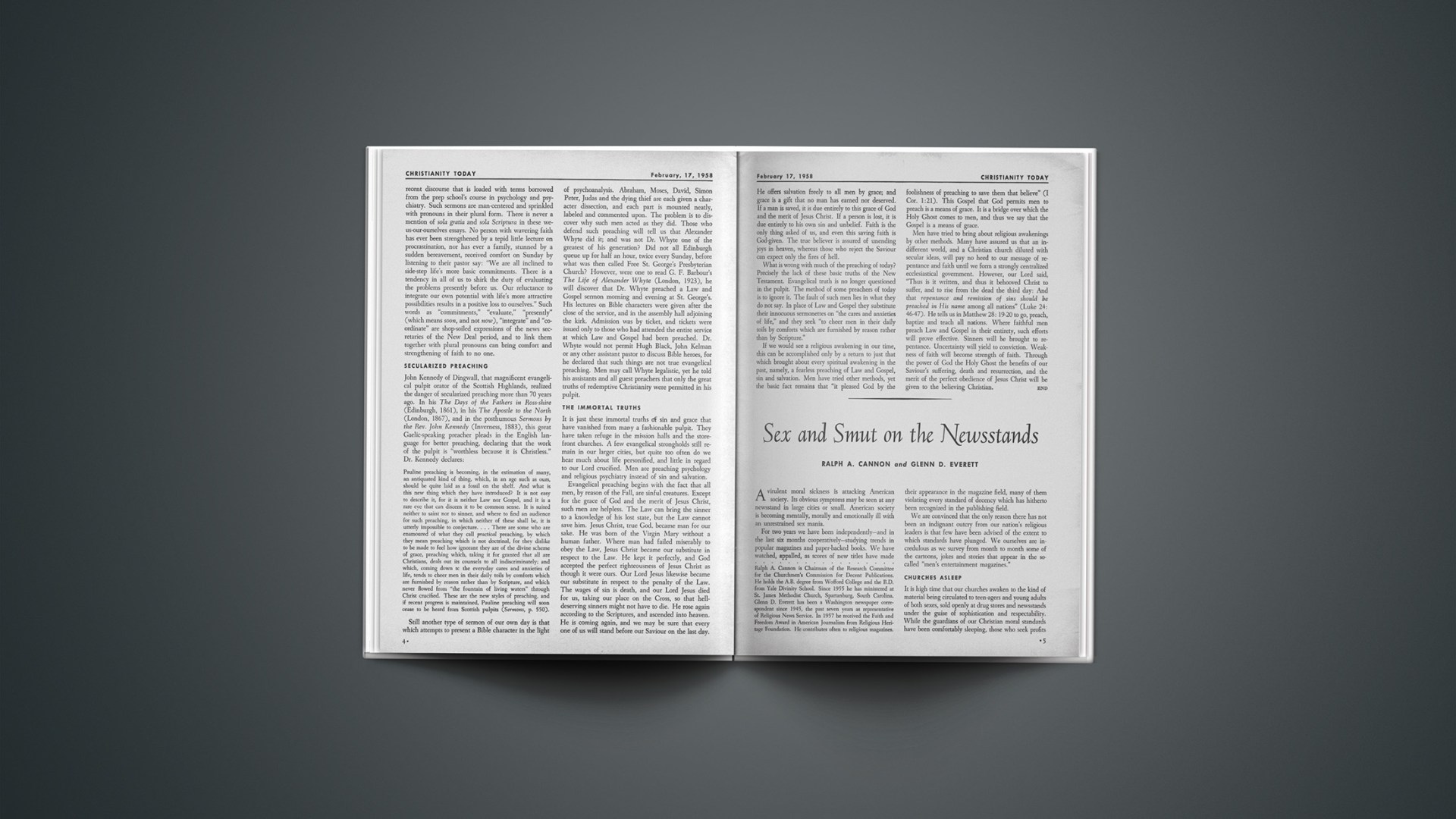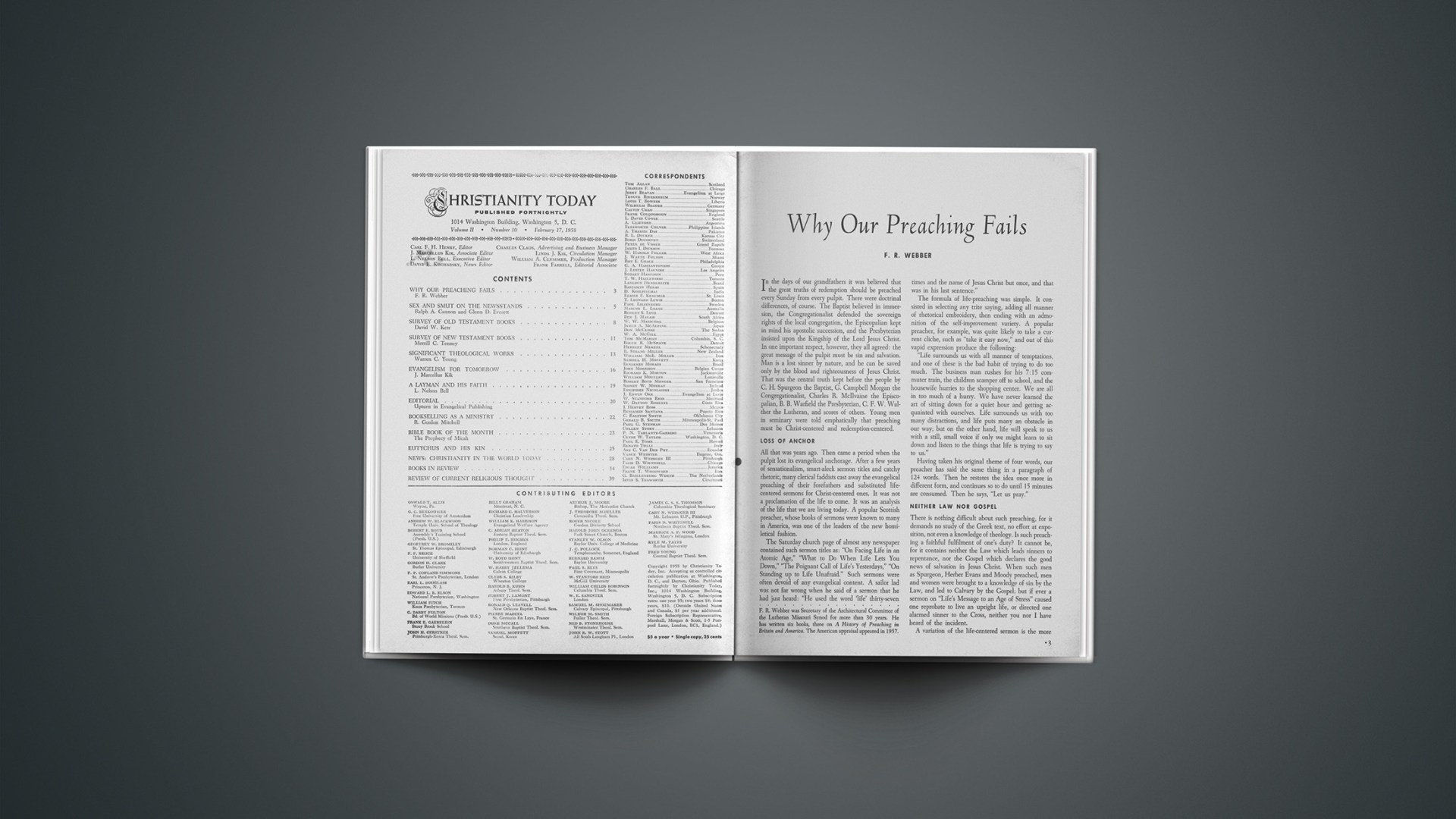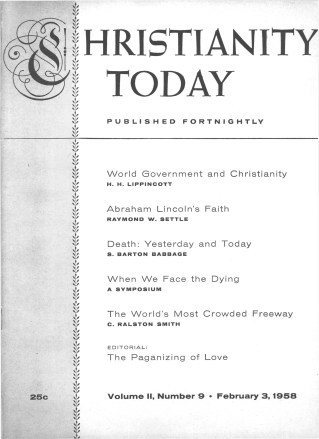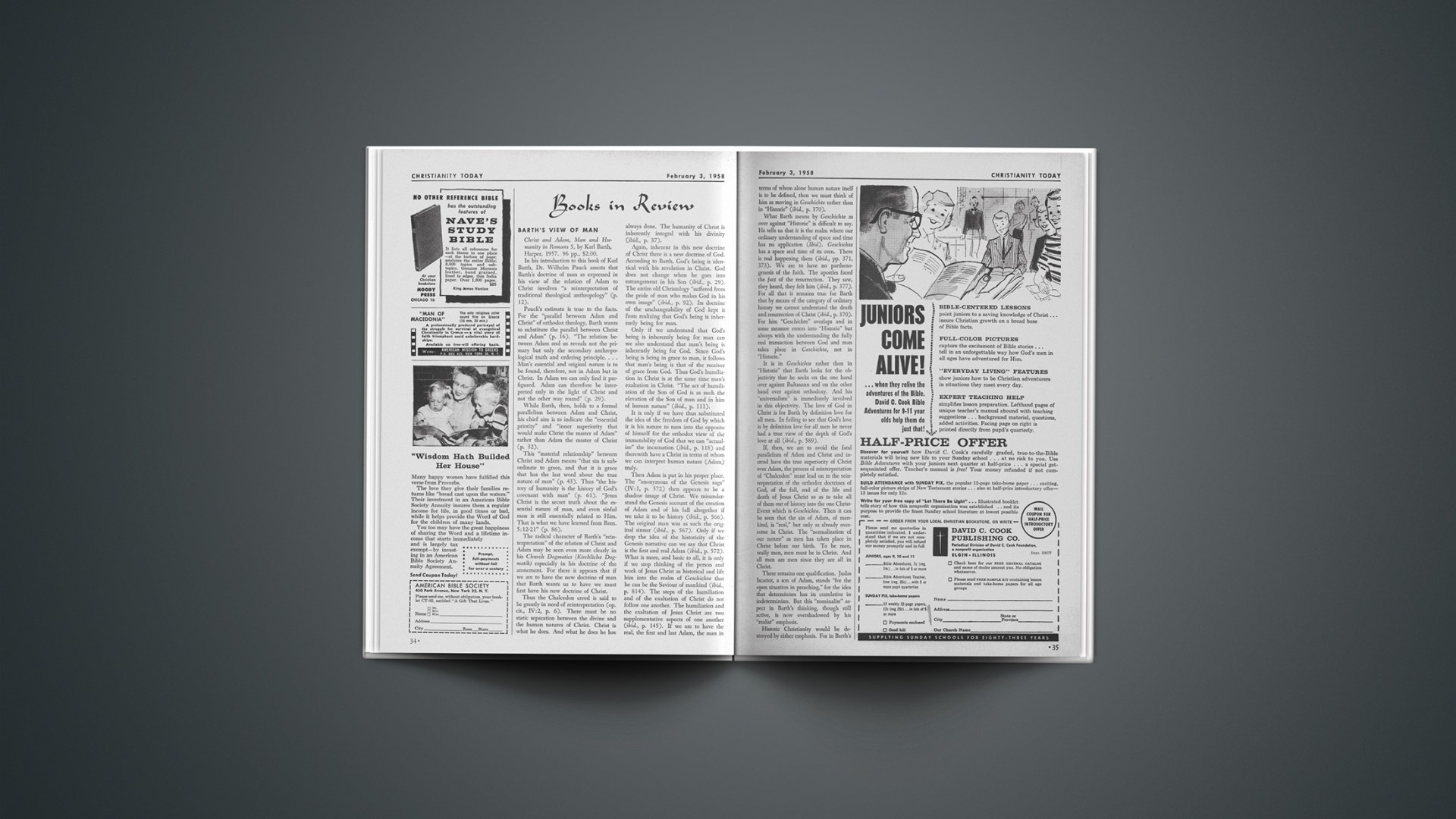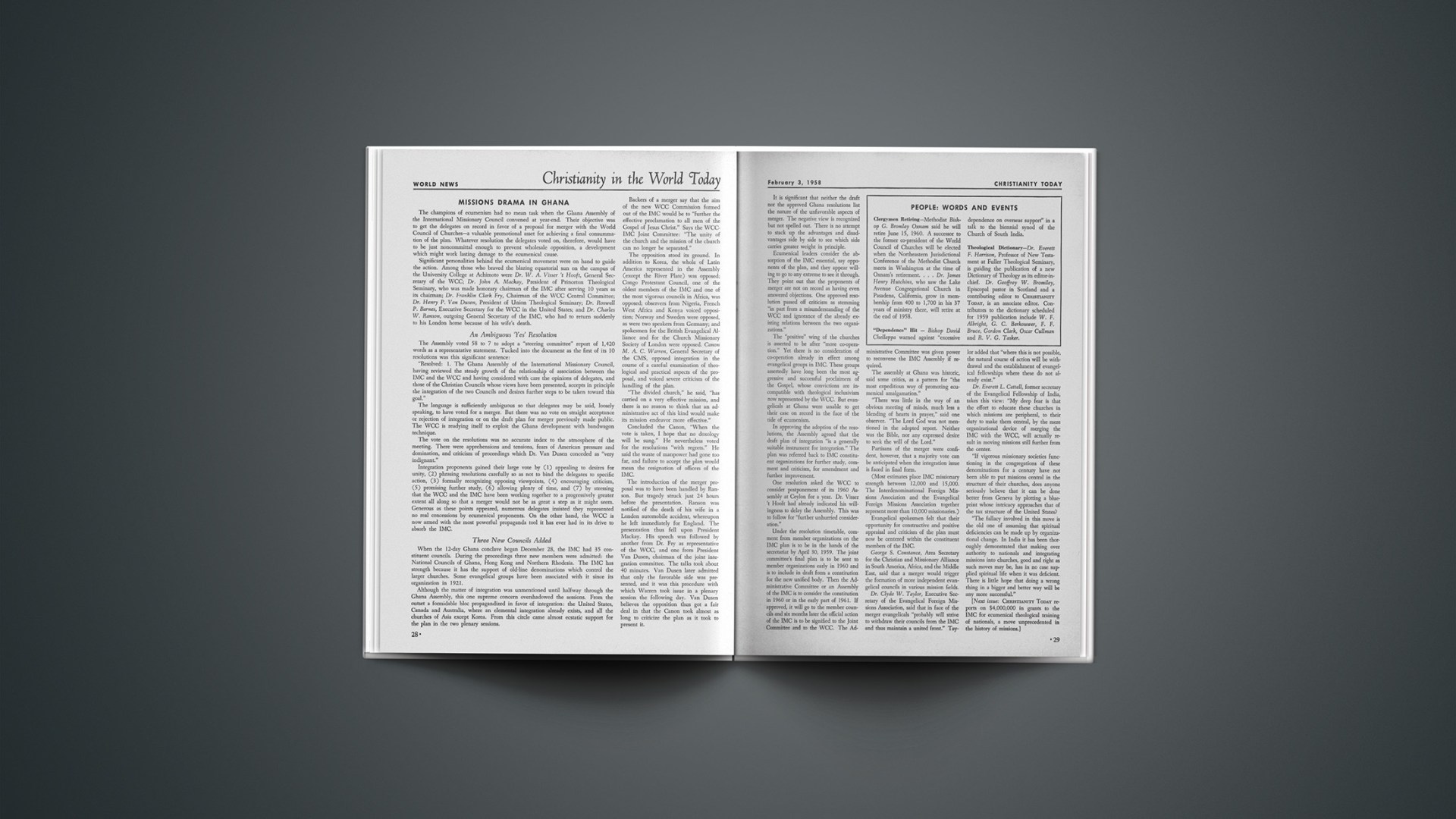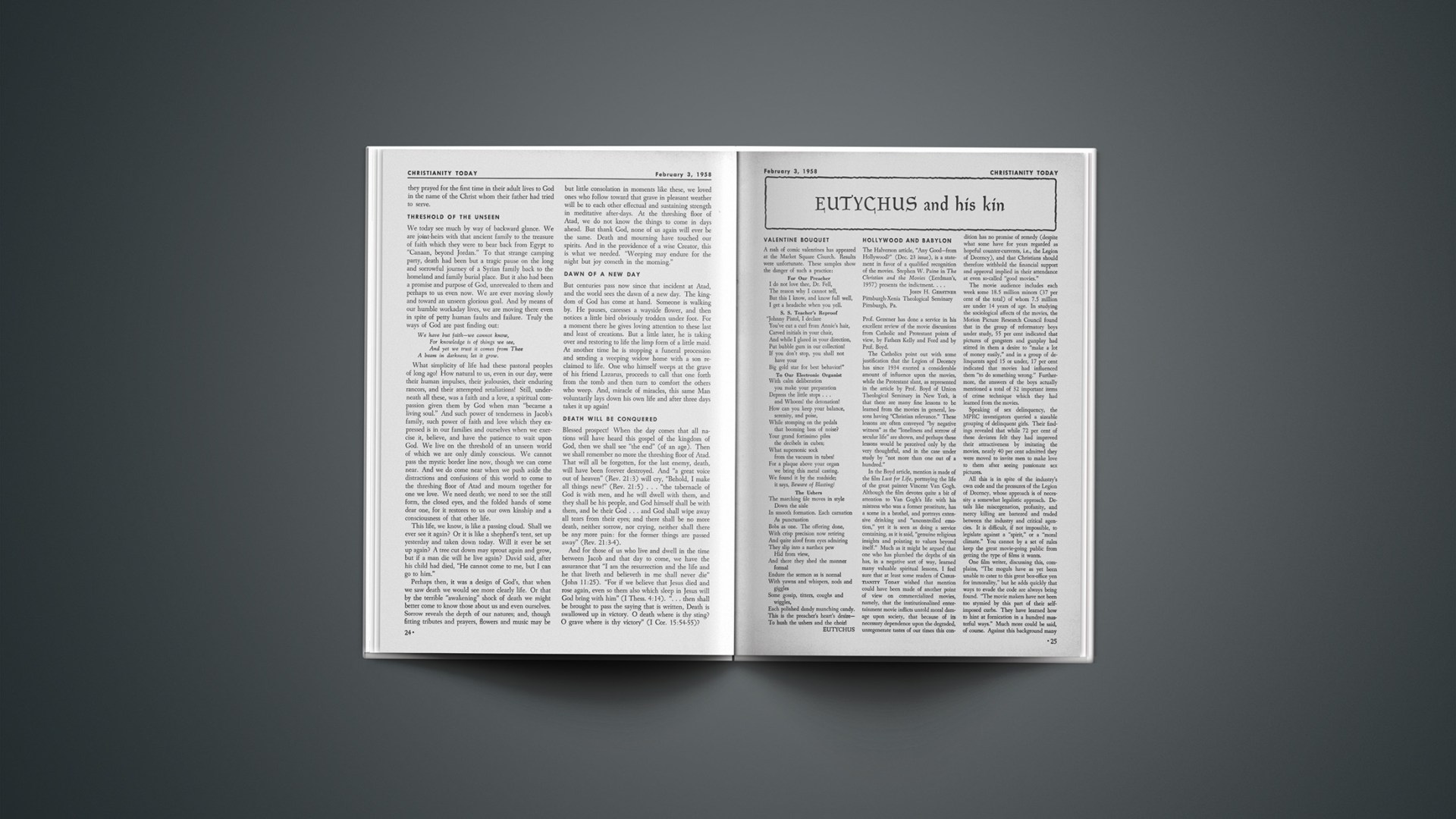A survey such as this is beset with difficulties, since it requires certain necessary and somewhat arbitrary limitations. In this case the bounds have been set by considering theological works of the more philosophical and apologetic nature. No attempt has been made to include books in the fields of biblical theology and Christian ethics.
The year showed evidence in several ways of a growing concern with the kerygmatic theology of Rudolf Bultmann. For a brief but clear and thoughtful introduction to Bultmann, Existentialism and Theology (Philosophical Library) by George W. Davis, is unexcelled. Bultmann is endeavoring to show the world that Christianity is not myth but “fact productive of a tremendous faith in God’s loving concern and activity” (p. 31). Yet, Bultmann believes that the “New Testament myth” obscures the Gospel for the modern, scientifically brain-washed mind. That is, the kerygma must not be confused with the mythical world view of biblical times in which it is clothed and expressed. For example, as Professor Davis points out, to Bultmann the death of Christ on the cross for our sins is biblical myth—meaningless to modern man; but the idea of the sacrifice of the cross being existentially present and breaking the power of sin in personal life is the good news of Christianity. You may not agree with Bultmann but Davis makes clear what he is trying to do.
Under the title, The Doctrine of God (Vol. II, Part 1, Scribner’s), another section of Karl Barth’s monumental Dogmatik has been made available to us in English. Without doubt that decision to make Barth’s magnum opus available in English represents a major theological event of our day. And whether or not one agrees with Barth does not alter the fact that for the last four decades he has stirred the theological world more than any other man.
In this section Barth begins with the problem of the knowability of God. God can be known in his activity. “He can be known of and by himself. In his essence, as it is turned to us in his activity, he is so constituted that he can be known by us” (p. 65). This God is known to us as “the one who loves” (p. 275). “God’s loving is necessary, for it is the being, the essence and the nature of God” (p. 280). God alone is a person. This God whose being is love exists in the three eternal modes, Father, Son and Holy Spirit (Barth is not a modalist in the usual sense of the term). “For the Son of God who became flesh in Jesus Christ is, as an eternal mode of the divine being, nothing more nor less than the principle and basis of all divine immanence, and therefore the principle of what we have called the secondary absoluteness of God” (p. 317).
Because of this “absoluteness” Jesus Christ is the only true personality in history and in him we become persons by being adopted into fellowship with God’s personal being (p. 286). What Barth means is that sin perverts our true humanity and that we are only truly human when we respond to God’s love with reciprocating love. As one reads Barth’s long and often tedious discussions, it is hard to see why thousands of pages and millions of words are really necessary.
Tillich On Christ
The most speculative work, and least biblical in nature, to appear last year was the second volume of Paul Tillich’s Systematic Theology (University of Chicago Press), subtitled Existence and the Christ. Here he continues his symbolic or mythical approach to theology which has so characterized his understanding of the Christian faith. Those of us who have been accustomed to an historically realistic understanding of the Christian Gospel find it difficult to appreciate Tillich’s symbolism.
Tillich insists that man is a fallen creature in his very creation (p. 44). The primal perfection of man before the Fall is, for him, but “dreaming innocence” (p. 33). There is no point in time and space in which created goodness was actualized and had existence.
Man’s hope, the new age, is come in the paradox of the man Jesus as the Christ. This does not mean an historical Incarnation, “for the assertion that ‘God has become man’ is not a paradoxical but a nonsensical statement” (p. 94). “Much harm has been done in Christianity, he writes, by a literalistic understanding of the symbol ‘son of God’ ” (p. 110). Instead, Tillich insists, Jesus is a man, subject to every contingency of existence, but keeping himself in unity with God by constant self-surrender and, at the same time, giving up everything he could have attained by this unity. It is in this ideal of self-surrender that we find, not Jesus the man, but Jesus as the Christ. Christianity was born, not with the birth of the man Jesus, but at that moment when one of his followers was driven to say of him, “Thou art the Christ” (p. 97). Jesus on the cross brings the new age because he suffers the death of a convict and a slave under the power of the old age which he is to conquer. He brings the New Being, for he saves men from the Old Being, that is, “from existential estrangement and its self-destructive consequences” (p. 150). No system could be much further removed from the idea of personal redemption through Jesus Christ, God Incarnate, than this symbolic theology of Paul Tillich.
On Man And Sin
An interesting study of man comes from an Australian scholar, S. B. Babbage, entiled Man in Nature and in Grace (Eerdmans). This is an excellent survey, succinct and relevant. In fascinating fashion the author covers areas of Scripture, the classics, historical theology, politics, existentialism, literature, and finally man’s immortality. Throughout the study he shows the points of difference between the various views discussed and the biblical understanding of man. He does not hesitate to point out that Augustine “was neither consistently nor thoroughly biblical” (p. 44), and that he was indebted to Plato for many of his ideas. His frankness of approach and his willingness to re-examine long accepted ideas is needed constantly.
The best study on the work of Christ was William J. Wolf’s No Cross, No Crown (Doubleday). Since it has already been called the most useful and complete study of the Atonement available today (by a reviewer), it is likely that we will be aware of its emphasis for some time to come. Professor Wolf first covers the biblical teaching on the subject at the point where he rejects the idea of penal substitution. Christ atones by dedication of life, not by substitutionary death. In the second section he deals with the Atonement in history, and lastly, its meaning for us today. Christ redeems us from the past (guilt), in the present (justification), and for the future (sanctification). The author puts considerable weight on the Church as the atoning community today. Wolf places much stress on the suffering of God who gives himself for sin. A good point of emphasis is the suffering of Christ as God as well as man. Yet, it is evident that the atoning work of God is to be found more in suffering itself than in the suffering and death of Christ. Without the cross in life, there is no crown. We too in a sense atone for sin through our willingness to give ourselves. “In our best moments we are responsive to the claims of suffering redemptively for those we love, and yet we recognize that this is really due to the power of God working in us” (p. 199). Again we read, “Human love reaches its peak in costly sacrificial outpouring, or suffering for others. The perfect expression of this paradox is found in the God-man as atoner” (p. 200). Is this the biblical picture of atonement? Is suffering per se the atoning work of God in history?
Niebuhr And Carnell
Richard R. Niebuhr’s Resurrection and Historical Reason (Scribner’s) seems to be an exceedingly important work. Although primarily intended as a study in theological method, using the Resurrection of Christ as the key to the investigation, this book also provides us with one of the most penetrating apologetics for the Resurrection fact to appear in many years. The argument centers around “the contention that any attempt to give the Church status, as the Church, independently of its origin in the Resurrection must fail. Failure is certain because such attempts, in dissolving the historic background of the Church, dissolve the Church also, and with it, Jesus Christ” (p. 153). Throughout this thrilling work, as the author makes his critical evaluation of theologians of varying perspectives, he emphasizes again and again that “the excision of the Resurrection tradition from the fabric of the Gospel history is followed by the disintegration of the entire historical sequence of the New Testament” (p. 14). We must quote Dr. Niebuhr directly once again: “No amount of patching with the concepts of hero and of immortality can make a unity of the history again, once the passion and death are surrendered through the dissolution of the Resurrection as the key to the meaning of the New Testament” (p. 16). Strange indeed are the turnings in modern theology as a Niebuhr of a new generation argues for the historicity of the Resurrection from Harvard Divinity School! It is evident that this great name in theological discussion is going to be with us for many years to come.
Last, but certainly not least, is the work by Edward J. Carnell, Christian Commitment (Macmillan), also in the area of apologetics. The viewpoint of this work is fresh and somewhat unique. Professor Carnell’s thesis is built around the fact of the inadequacy of rational and empirical methodology alone in the area of Christian epistemology. The methods of acquaintance and inference give us ontological truth and propositional truth, but not the whole truth. There is also needed what Dr. Carnell calls the third way of knowing, “moral self-acceptance,” which leads to the truth of personal rectitude. To know is to be morally responsible for knowing. “Moral facts are never rationally known until they are spiritually felt” (p. 7). He rightly points out that “Ultimate reality cannot be grasped unless rational knowledge is savored by spiritual conviction” (p. 13). “The content of the imperative essence cannot be apprehended until one is spiritually transformed by the sum of those duties which already hold him” (p. 22).
Dr. Carnell is not afraid to accept truth no matte: where he finds it. The insights of great thinkers are accepted even though they may not stand fully within the evangelical tradition. Hence, he is quite ready to recognize the contribution of such men as Kierkegaard, but he is also just as ready to point out their inadequacies. While Kierkegaard, “using the cold steel of relentless dialectic, chisels away the very foundation of formalistic ethics” (p. 74), at the same time his methodology fails because of his unwillingness to undergird his existentialism with proper and reasonable support based on the sufficiency of evidence (pp. 75–79).
By uniting the three ways of knowing, Professor Carnell has been of real service to the Christian Church. Without the third way there is a definite emptiness. “We certainly dare not treat God as an object; he cannot be regarded as the conclusion of a rational argument. God must be spiritually experienced; he must be encountered in the dynamic of fellowship” (p. 127). God does not speak to abstract, universal man in rationalistic propositions, for such a man does not exist. But God does encounter John, Mary—you and me—in existential experience—in the act of living itself.
Hence, Dr. Carnell can point out that logic has its definite limitations in the presentation of Christian truth. There is something in the Christian faith that transcends the propositional structure of Aristotelian logic and the scientific method. “Whenever a systematic theologian becomes too systematic, he ends up falsifying some aspect of revelation” (p. 285). Our author is saying that revelation cannot always be stated and conveyed in propositional form, for God meets man in the personal, revelatory experience—if we understand him rightly.
While 1957 probably was not the greatest year in the area of theological publishing, it certainly has been most interesting in its developments. We may well be on the threshold of a new era in theological discussion. There are changes of emphasis evident among thinkers of all theological perspectives. The old lines of demarcation seem to be more and more intermingled, if not quite tangled up. There are definite suggestions in the air of exciting developments in the years immediately ahead.
Warren C. Young is a Canadian by birth, and is author of A Christian Approach to Philosophy (1954). He is Professor of Christian Philosophy at Northern Baptist Theological Seminary, and recently was elected President of Evangelical Theological Society. He holds the A.B. degree from Gordon College, the A.M. and Ph.D. degrees from Boston University.

